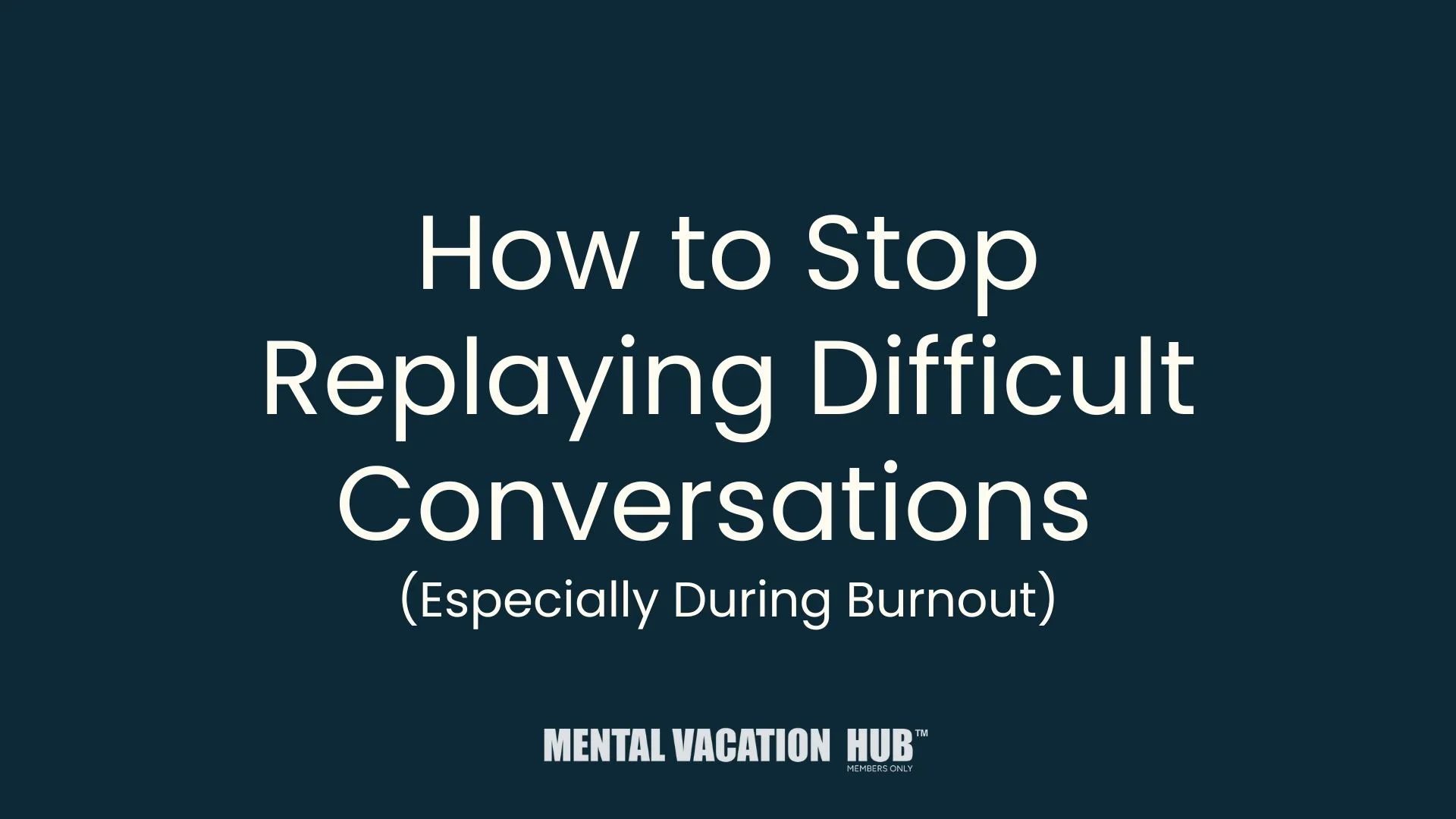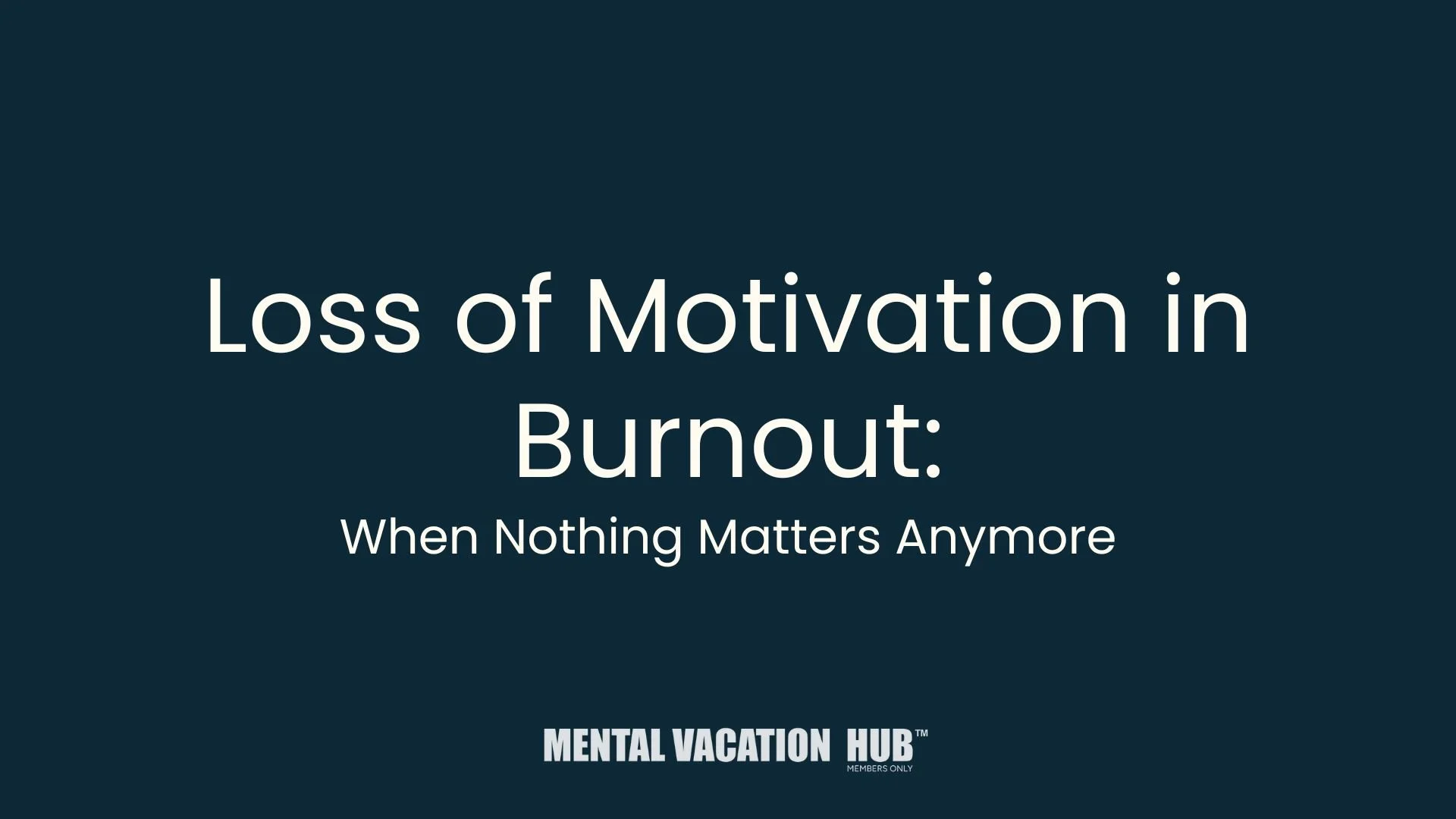Why Rest Doesn't Fix Burnout: Understanding Recovery Resistance
Rest does not fix burnout.
This is one of the hardest truths about burnout recovery.
You take a vacation, sleep for days, or step away from work for a week. You expect to feel better. Instead, you return just as exhausted, anxious, and depleted as before.
You wonder why rest is not working. You start to believe recovery is impossible.
The problem is not that rest is useless. The problem is that burnout is not just tiredness. It is a physiological and psychological condition that changes your nervous system, brain chemistry, and stress response. A weekend off cannot reverse months or years of chronic stress.
I learned this the hard way. I took time off during my burnout and felt no better. I thought I was broken. I was not broken. I just needed deeper intervention than rest alone could provide.
This post explains why rest does not fix burnout, what happens in your body during chronic stress, and what you actually need to recover.
What Happens to Your Body During Burnout
Burnout is not just mental exhaustion.
It causes measurable physiological changes that rest alone cannot reverse.
When you experience chronic stress, your body stays in fight-or-flight mode for extended periods. This is helpful in short bursts, but sustained activation damages your systems.
Your nervous system, hormones, brain structure, and immune function all change in response to prolonged stress.
Key physiological changes during burnout:
Nervous system dysregulation: Your sympathetic nervous system (fight-or-flight) stays activated, and your parasympathetic nervous system (rest-and-digest) cannot engage. You stay wired even when you try to rest.
Adrenal fatigue: Chronic cortisol production exhausts your adrenal glands. You experience persistent fatigue, low energy, and difficulty managing stress.
Brain structure changes: Chronic stress shrinks the hippocampus (memory and learning) and enlarges the amygdala (fear and anxiety). This makes it harder to think clearly, regulate emotions, and feel safe.
Neurotransmitter depletion: Prolonged stress depletes serotonin, dopamine, and other neurotransmitters. This affects mood, motivation, focus, and pleasure.
Immune suppression: Elevated cortisol weakens your immune system. You get sick more often and recover more slowly.
These changes do not reverse with a few days of rest. Your body needs time, specific interventions, and sustained recovery practices to heal.
I did not understand this at the beginning of my burnout journey.
I thought if I just slept more or took a break, I would feel better.
But my nervous system was stuck in overdrive, and rest alone could not reset it.
Why Vacation Doesn't Fix Burnout
Vacation feels like the obvious solution to burnout.
You step away from work, relax, and recharge. But most people return from vacation feeling just as burned out as before.
Here is why vacation does not fix burnout.
A vacation is too short. Burnout develops over months or years. A one-week vacation cannot reverse that level of physiological damage. Your body needs sustained rest, not a brief pause.
Your nervous system stays activated. Even on vacation, your brain may stay in work mode. You check emails, worry about what you are missing, or plan for your return. Your nervous system never fully shifts into rest mode.
You return to the same environment. Vacation provides temporary relief, but you return to the same workload, pressure, and stressors that caused burnout. Without changing the environment, burnout returns immediately.
You do not address the root cause. Burnout is not just about needing a break. It is about unsustainable work patterns, lack of boundaries, perfectionism, or toxic environments. Vacation does not fix these underlying issues.
Recovery resistance sets in. In severe burnout, your body becomes resistant to rest. Your nervous system is so dysregulated that you cannot relax, even when you have time off. You feel wired and tired at the same time.
What Is Recovery Resistance?
Recovery resistance is when your body cannot respond to rest, even when you have the opportunity.
This is common in stage 4 and stage 5 burnout, where chronic stress has dysregulated your systems so severely that rest feels impossible.
Signs of recovery resistance:
You have time off, but you cannot relax or enjoy it.
You sleep for hours but wake up exhausted.
You feel anxious, restless, or guilty when you are not working.
Your mind races even when you try to rest.
You feel physically uncomfortable when you stop moving or working.
Recovery resistance happens because your nervous system has been in overdrive for so long that it no longer knows how to downshift.
Your body interprets rest as unsafe or unfamiliar. You stay activated even when there is no threat.
This is a physiological response to chronic stress. Your body needs retraining, not just rest.
I experienced recovery resistance for months.
I would lie down to rest and feel my heart race. I would take a day off and feel more anxious than when I was working.
My body had forgotten how to rest.
Why Rest Alone Is Not Enough
Rest is necessary for burnout recovery, but it is not sufficient.
Burnout recovery requires addressing the physiological, psychological, and environmental factors that cause and sustain burnout.
What burnout recovery actually requires:
Extended rest (not just a vacation). Recovery from severe burnout takes months, not days. You need sustained time away from the stressors that caused burnout. This may mean medical leave, reduced hours, or a career change.
Nervous system regulation. Your nervous system needs retraining to shift out of fight-or-flight mode. This requires practices like breathwork, gentle movement, mindfulness, and time in nature. Take them seriously, as these are not luxuries. They are medical interventions.
Professional support. Burnout recovery often requires therapy, coaching, or medical care. A therapist can help you process the emotional toll and develop coping strategies. A doctor can assess your physical health and rule out other conditions. A burnout coach can guide you through structured recovery.
Lifestyle and work changes. If you return to the same patterns that caused burnout, you will burn out again. Recovery requires setting boundaries, reducing workload, addressing perfectionism, and building sustainable work habits.
Addressing underlying trauma or mental health conditions. Burnout often coexists with anxiety, depression, or unresolved trauma. These conditions require separate treatment and will not resolve with rest alone.
Rebuilding physical health. Burnout damages your immune system, sleep, and energy levels. Recovery requires prioritizing nutrition, sleep hygiene, gentle exercise, and medical care.
Rest is the foundation, but recovery is a multi-layered process that takes time, support, and intentional intervention.
What You Actually Need to Recover from Burnout
If rest alone does not fix burnout, what does?
Here is what burnout recovery actually requires.
Step 1: Take extended time off.
You cannot recover while working full-time.
Take medical leave if possible. If not, reduce your hours and responsibilities drastically.
Your body needs months, not weeks, to heal. Sometimes it takes years.
Step 2: Regulate your nervous system.
Practice daily nervous system regulation: deep breathing, progressive muscle relaxation, gentle yoga, or time in nature.
These practices teach your body to shift out of fight-or-flight mode.
Step 3: Seek professional help.
Work with a therapist, doctor, or burnout coach who understands chronic stress.
You may need therapy to process emotions, medical care to address physical symptoms, or coaching to guide your recovery.
Step 4: Address the root cause.
Identify what caused your burnout: workload, perfectionism, lack of boundaries, toxic environment, or personal patterns.
Recovery requires changing these factors, not just resting from them.
Step 5: Rebuild physical health.
Prioritize sleep, nutrition, hydration, and gentle movement.
Your body needs fuel and rest to repair. Avoid caffeine, alcohol, and processed foods that disrupt recovery.
Step 6: Set boundaries and change your work structure.
Recovery is not about returning to the same patterns.
It is about building a life where burnout cannot happen again. Set clear work boundaries, delegate tasks, and redefine success to include well-being.
Step 7: Be patient.
Burnout recovery is slow.
You will have good days and bad days. Progress is not linear. Give yourself time and compassion.
FAQ
How long does burnout recovery take if rest doesn't fix it?
Burnout recovery typically takes six months to two-three years, depending on severity.
Mild burnout may improve in weeks to months with rest and intervention. Severe burnout (stage 4 or 5) requires extended time off, professional support, and significant lifestyle changes.
Recovery is not linear, and patience is essential.
Why do I feel worse after resting during burnout?
This is recovery resistance.
Your nervous system is so dysregulated that rest feels unfamiliar or unsafe. You may feel anxious, restless, or guilty when you stop working. This improves with nervous system regulation practices and time.
Your body needs to relearn how to rest.
Can I recover from burnout while still working?
It is difficult but possible in mild burnout.
Severe burnout requires extended time off. If you must work, reduce your hours drastically, set strict boundaries, and prioritize nervous system regulation and professional support. And make sure to have a reliable, truly competent executive assistant.
Recovery while working full-time is rarely successful.
What is the difference between rest and recovery?
Rest is stopping work and taking time off.
Recovery is the active process of healing your nervous system, addressing root causes, and rebuilding physical and mental health.
Rest is necessary for recovery, but recovery requires more than rest alone.
Do I need therapy to recover from burnout?
Not always, but it helps.
Therapy can address the emotional toll of burnout, help you process trauma, and develop coping strategies. If burnout coexists with anxiety, depression, or perfectionism, therapy is essential.
Many people recover faster with professional support than without it.
Conclusion
Rest does not fix burnout because burnout is not just tiredness.
It is a physiological and psychological condition that changes your nervous system, brain chemistry, and stress response.
Vacation provides temporary relief, but it does not reverse months or years of chronic stress.
Burnout recovery requires extended rest, nervous system regulation, professional support, and changes to the patterns that caused burnout. Recovery is slow, non-linear, and requires patience. But it is possible.
If rest alone is not working, you are not broken. You just need deeper intervention. Give yourself time, seek support, and know that recovery is a process, not a quick fix.
You May Also Like:
Ready to recover? Get Your Burnout SOS Handbook:

Burnout SOS Handbook: Practical steps to understand, survive, and recover from your burnout. Easy to follow - just right for a brain-fogged head. Start your healing today!
Take the Burnout Test
Our 5-minute Burnout Test cuts through the confusion and gives you a personalized snapshot of where you stand and what comes next.
Start the test →




